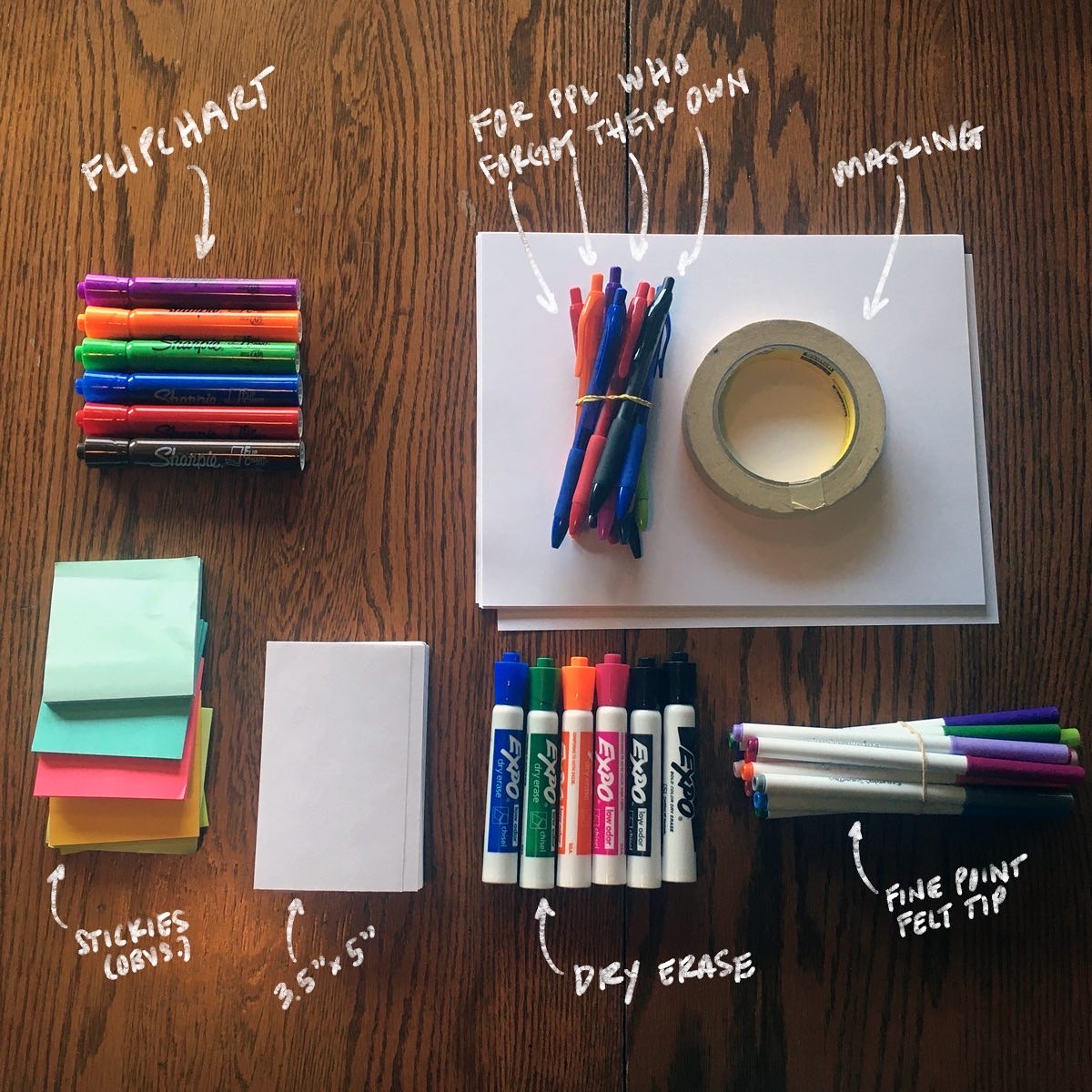Imagine you’re sitting down for a last-minute review of your facilitation agenda with your co-facilitator.
Scanning, they make a suggestion, “What if we did this activity like this instead?” and you think, “Yes! Good idea, let’s change it.”
Then you realize, “Oh no – we can’t. I forgot to ask for sticky notes.”
Now you’re stuck debating whether to text your point of contact for the last-minute ask, to try to find time to run to an office supplies store, or to skip the idea.
This same thing happens again mid-facilitation, except this time it is you who has the new idea but you don’t have any markers or scrap paper.
These moments used to be an every-other-workshop occurrence for me.
I’d send a list of supplies that I knew I would need ahead of time, and last minute (or in the moment) it would become apparent to me that I should have given myself more options. Sometimes I would forget to ask for the just-in-case supplies. Other times I was held back by a fear that if I asked for supplies and didn’t use them it would make me look unprofessional.
Trying to address this problem, I started asking for one or two just-in-case supplies, “Hey can you bring sticky notes, on the off chance we need them?” While it was an improvement, it only limited the times where I was stuck, it didn’t eliminate them.
I set out to create a list to use for every facilitation that I would do in the future. I wanted to create a list of supplies that would…
- Open up a range of different activities;
- Be used in most workplaces or communities (in case we didn’t use them);
- Were easy to find; and
- Inexpensive to purchase (in case they didn’t have them on-hand).
Enter My Go-To Facilitation Rider
A rider is something you add to your contract that lists extra requirements. For the past few months, no matter what the training is, I share a rider with my contact asking for these supplies:
- Blank paper (at least a few of sheets per person, scrap is ideal)
- 3”x3” sticky notes (few full pads, or enough for everyone to use 5-10 stickies)
- Index cards (1 stack)
- Pens (at least 1 per participant)
- Markers (at least 1 per participant, permanent markers are not ideal)
- Sticky flip chart paper & easel (chart must be able to attach to the easel)
- Flip chart markers
- Tape (blue or masking)
When I’m sharing my list of supplies for the specific workshop, I always list these, or share a Google Drive document (here’s a link for a sample), and give the following context via email:
“I like to be able to pivot and meet the needs of the group if we go off the planned agenda. Would you be able to provide some supplies in case we need to switch gears?”
Instead of pushback, I get responses of affirmation. My clients have all been excited to provide extra supplies to allow for flexibility, knowing they’re helping me do my job well.
Ride or Die
Using this rider with my facilitation clients has been a game-changer.
Now, when I sit down for last-minute reviews, I know I can easily adjust. When things arise in workshops, I have a wealth of options I can choose from. Between this list and a deck of Facilitator Cards I have never felt more able to be flexible with my group. And, instead of my fear of looking unprofessional, I feel like I’ve stepped up to a new tier of professionalism.
When a client can’t provide these supplies, I pack them myself. It’s not a huge deal. But it’s always easier to travel light, and to not worry about doing a supply run in addition to planning and prepping the processes, activities, and experiences – the aspects of the training I’d rather focus my energy on.
Wondering whether or not you should add this rider to your contracts or client convos? Ask yourself:
- Do I want to make for easy flexibility into my workshops?
- Be able to change things up, or alter my agenda, last minute?
- Or follow where the group is going, without feeling stuck because I don’t have the supplies or ideas that I need?
If you answer “Yes!” or “Maybe!” to any of those, I’d encourage you to consider building your own go-to rider for all your workshops. Or just borrow mine.
This post was originally posted at the Facilitator Cards blog. Facilitator Cards are set of processing tools for facilitators (not our participants) that help facilitators prepare, improvise, and respond better to their groups. Learn more at the Facilitator Cards website.

